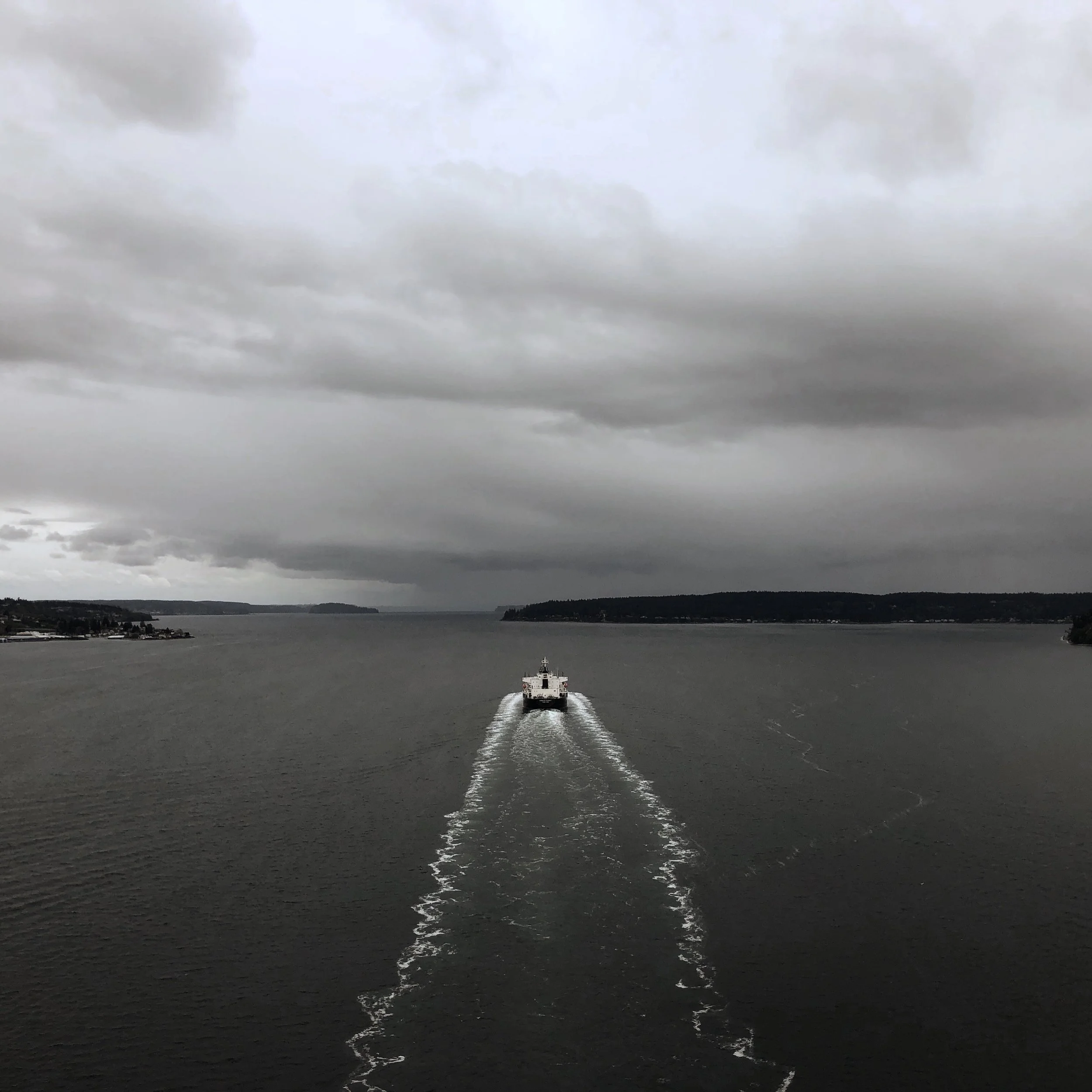In the latter stages of my long run this week, I crossed the Tacoma Narrows. On the way out, the wind was at my back, but on the return journey, the wind pummeled me hard, forcing me to keep my head at an odd angle to prevent my hat from taking flight. This also kept my eyesight limited to the few paces directly before me. At certain points, the gigantic, concrete supports holding the bridge above the Narrows blocked the turbulent wind, granting me reprieve from the buffeting gusts. During the first such respite, I straightened my posture.
As soon as I was allowed to see further than the few feet comprising my immediate future, an enormous ship commanded my sudden attention. It startled me. In that brief instant between optical reception and conscious mental cognition, all I understood was the immensity of the thing, rather than what the thing actually was. My adrenaline spiked, as though I was in danger. A moment long enough to be noticeable passed after I saw the ship and before I knew what it was.
I chuckled to myself, perhaps at myself. This was nothing to fear. Not directly. I was in no immanent danger. Not from the ship, anyway. Though my legs certainly muttered idle threats and displeased curses in response to the mileage I had traveled, and in anticipation of the miles yet remaining.
This seemingly misplaced surprise and reflexive fear of an innocuous ship that meant no harm struck me as odd, intriguing. (I’m reminded of the Aztecs once they discovered Cortez’s ships approaching. For them, the understanding of what they were seeing would come far too late, but the surprise had to be similar.)
And as I continued my run, I could not take my eyes off the ship. I held onto my hat with my left hand to prevent its otherwise inevitable escape and stared at the impressive vessel. By the time I stood directly behind it, marveling at the wake, I knew I had to snap a photo. It was poetic, and profound.
****
Human capability is staggering. In just a few million years, in the blink of a cosmic eye, we’ve evolved from local hunter-gatherer tribes into a global community of collective individuals with the capacity to engineer unthinkably heavy objects into shapes that can float upon the surface of the deep, and this even when those same raw materials crafted into other shapes would sink without hesitation.
Crazier still, we have managed to hold differently shaped objects aloft in the sky and cross thousands of miles in virtually no time at all, a feat our hunter-gatherer ancestors would have been unable to even comprehend.
And on a far smaller, more individual scale, we have so much more potential than most of us imagine.
The run on which I saw this ship was twenty-seven miles long. I ran this distance because it is my bliss, not because I’m training for anything specific; I would have run this far regardless. There is no goal in mind, just a casual marathon. And I don’t say this to sound impressive, because, to me, there is very little about it that is impressive. And yet, to someone who doesn’t run, or someone who has only just started running, this kind of mileage sounds impossible. But I’ve been running for close to twelve years and I certainly didn’t start where I am now.
The enormity of that ship and my casual marathon are analogous: from hunter-gatherers to formidable masters of technological progress, from a few slow miles in high school to an aimless Sunday marathon. Time, consistency, and relentless curiosity as to the true nature of limitations are a few of the many common denominators.
And don’t think I’m making a moral statement with any of this. In my mind, advancement does not necessarily have any intrinsic positive value to it, and what value it has is only that which we assign. I tend to romanticize hunter-gatherer societies and, for all their obvious industrial disadvantages, I think I would be far happier as a member of a small society ere modernity. Additionally, I don’t think twenty-seven miles is “better” than two miles. I care less about specifics and more about the concept. We approach our perceived limitations, size them up, and in defiance ask of them, “just how mutable are you?” Our human audacity to ask that question is of far greater interest to me than the answer to the question itself.
****
Sure, some amongst our species has used this curiosity to terrible, inhumane ends (nuclear bombs come readily to mind). And yes, it’s quite possible that this curiosity will be responsible for both our unprecedented rise and our cataclysmic fall. But the opposite is also true. Perhaps, as we approach insurmountable existential threats, both individually and globally, our limits will prove themselves to be a bit more malleable than we think.
Maybe we are more resilient than we give ourselves credit for. Maybe all of us have that casual marathon within us. Maybe our collective minds will manage to solve the problems our own progress created. Maybe we’ll build the ship that defies what we once thought possible. And maybe we’ll sail that ship into the metaphorical sunset as we greet our next set of challenges with eager minds and brave souls, wizened by both our past triumphs and our shortcomings.
